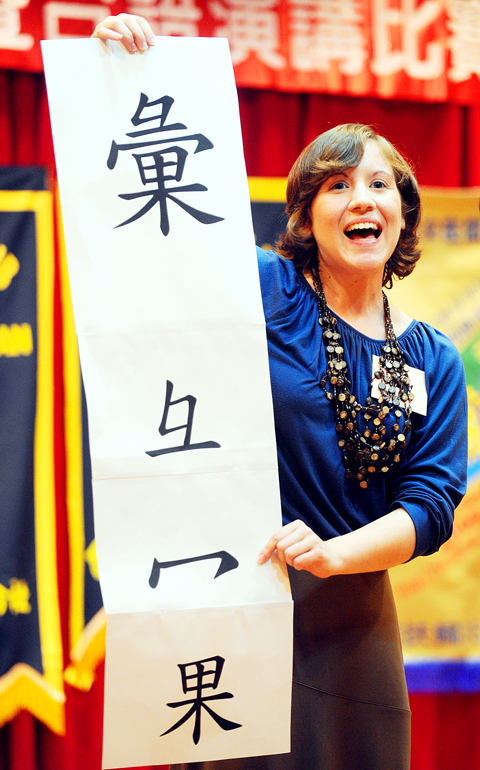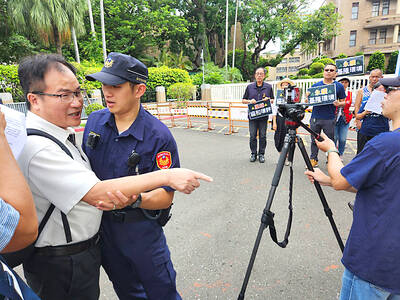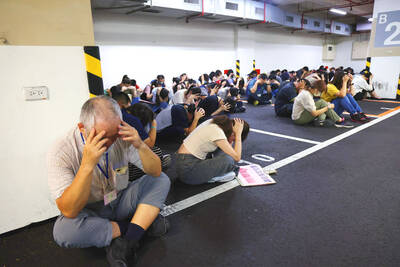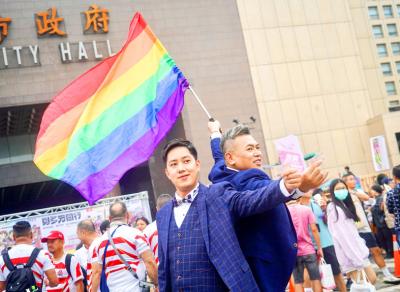Fifty-five students from 16 countries studying in Taiwan took part in a Mandarin and Hoklo (also known as Taiwanese) speech contest in Taipei yesterday, sharing their experiences in language learning and living in Taiwan.
Twenty-two-year-old Russian student Romar Mikhailovich, who is studying Mandarin at National Chengchi University, said he enjoys living in Taipei because it is a city “with restaurants serving a wide variety of food, with small food stalls selling inexpensive yet delicious gourmet food” and is “a paradise for shopping,” with large shopping malls and night markets.
Mikhailovich said he especially enjoys the hospitality of Taiwanese.

PHOTO: LO PEI-DER,TAIPEI TIMES
“The people here are so friendly and welcoming, especially to foreigners,” he said.
Indian student Gujay Royson Pais said he was invited to talk about Indian culture to 800 students at an elementary school in Kaohsiung earlier this month, after the school was assigned to cheer for Indian athletes during the World Games.
“I was very worried because I was only in Taiwan for nine months at the time and I knew I couldn’t speak Mandarin well enough to introduce my own country,” he said.
He didn’t have to worry.
“The kids probably didn’t understand what I was talking about, but they listened attentively with smiles on their face. It gave me a lot of encouragement and confidence,” Pais said.
He said it really moved him when the students sang Hindi songs and cheered in Hindi when the Indian team played in the Games.
Many foreign students said they chose to learn Chinese in Taiwan instead of in China because they wanted to learn traditional Chinese.
South Korean student Lee Ji-yong said her friends were all surprised when she told them that she wanted to learn Chinese, since she majored in Korean literature at university.
“But to really master classic[al] Korean literature, learning Chinese is a must, because before the Korean writing system was created in the 15th century, Koreans used Chinese characters,” Lee told the audience.
She said she first went to China to learn Mandarin, but soon realized that learning simplified Chinese used in China didn’t help her much, since ancient literature was written in traditional Chinese.
She therefore decided to come to Taiwan.
“I think traditional Chinese characters are more artistic as well,” she said.
However, when she came to Taiwan, Lee discovered another beauty of the language.
“In China, people like to speak very loudly, but in Taiwan, people speak more tenderly,” Lee said. “So it was when I came to Taiwan I discovered that Mandarin can sound so pleasing to the ear.”
A total of 15 students from Japan, South Korea, Russia, India, the Philippines, Indonesia, Malaysia, Vietnam, Thailand, the US, Mexico, Colombia, Brazil, Germany, France and Switzerland took part in the annual event organized by the Rotary Club.
Also See: Work with China to teach: official

Environmental groups yesterday filed an appeal with the Executive Yuan, seeking to revoke the environmental impact assessment (EIA) conditionally approved in February for the Hsieh-ho Power Plant’s planned fourth liquefied natural gas (LNG) receiving station off the coast of Keelung. The appeal was filed jointly by the Protect Waimushan Seashore Action Group, the Wild at Heart Legal Defense Association and the Keelung City Taiwan Head Cultural Association, which together held a news conference outside the Executive Yuan in Taipei. Explaining the reasons for the appeal, Wang Hsing-chih (王醒之) of the Protect Waimushan Seashore Action Group said that the EIA failed to address

Taipei on Thursday held urban resilience air raid drills, with residents in one of the exercises’ three “key verification zones” reporting little to no difference compared with previous years, despite government pledges of stricter enforcement. Formerly known as the Wanan exercise, the air raid drills, which concluded yesterday, are now part of the “Urban Resilience Exercise,” which also incorporates the Minan disaster prevention and rescue exercise. In Taipei, the designated key verification zones — where the government said more stringent measures would be enforced — were Songshan (松山), Zhongshan (中山) and Zhongzheng (中正) districts. Air raid sirens sounded at 1:30pm, signaling the

The number of people who reported a same-sex spouse on their income tax increased 1.5-fold from 2020 to 2023, while the overall proportion of taxpayers reporting a spouse decreased by 4.4 percent from 2014 to 2023, Ministry of Finance data showed yesterday. The number of people reporting a spouse on their income tax trended upward from 2014 to 2019, the Department of Statistics said. However, the number decreased in 2020 and 2021, likely due to a drop in marriages during the COVID-19 pandemic and the income of some households falling below the taxable threshold, it said. The number of spousal tax filings rebounded

A saleswoman, surnamed Chen (陳), earlier this month was handed an 18-month prison term for embezzling more than 2,000 pairs of shoes while working at a department store in Tainan. The Tainan District Court convicted Chen of embezzlement in a ruling on July 7, sentencing her to prison for illegally profiting NT$7.32 million (US$248,929) at the expense of her employer. Chen was also given the opportunity to reach a financial settlement, but she declined. Chen was responsible for the sales counter of Nike shoes at Tainan’s Shinkong Mitsukoshi Zhongshan branch, where she had been employed since October 2019. She had previously worked